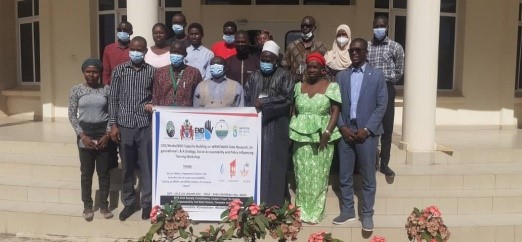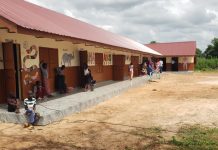By Nelson Manneh
A civil society organization called Young Volunteers for the Environment (YVE) together with partners, on Tuesday, 11 January engaged stakeholders on Water Resource Management and Social Accountability.
YVE which is a registered youth led non-profit organization, has expertise in environmental management, sustainable energy solutions and agro-ecology practices, advocates for environmental sustainability in the scope of access to basic energy, water, health and sanitation services in waste management, cultural biodiversity, climate change, natural resource management and a toxic free environment.
Together with Water Aid UK and Sanitation and Water for all Network, the objective of YVE is to strengthen the capacity of civil society, the media and NGOs in influencing policies and legislative frameworks at local and national levels, and to promote rights for the most marginalised and vulnerable groups in society. It also aims to inform the public about their position in promoting sustainable wash service delivery and the facilitation of integrated participatory planning in terms of WASH and WRM, by engaging national institutions and local governments in promoting these laws.
Joe Bongay, Executive Director of YVE, said the National Developmental Plan and WASH sector has a vision of increasing the population’s access to safe drinking water from 89.6% to 100%; improving sanitation facilities from 64.9% to 75% (NDP 2018-2021), and achieving 100% ODF status by 2021. The Gambia has made tremendous progress in improving the proportion of people using improved water sources for drinking. According to the MICS 2018, 85% of the overall population of the Gambia use improved water sources for drinking.
Bongay said the sanitation and hygiene sub-sector has made some progress in improving access to basic sanitation and hygiene. From the NDP report, 64.9% of the population has access to improved sanitation and 1% of the population still practice open defecation (MICS 2018).
He, however, said that the country is still below the SDG targets with 47% of the population having access to basic levels of sanitation (MICS, 2018); that less than one-third (30.3%) of households practice proper hand-washing as indicated in the NDP report (2018 – 2021); and that poor coordination, monitoring and evaluation, good governance, transparency, accountability, communication and a common framework for all partnerships and institutions are some of the challenges faced by the WASH sector.
In addition, he said, the COVID-19 pandemic has adversely affected people and can be averted by practicing good hygiene. He said this is the tip of the iceberg as 75% of all emerging diseases that are zoonotic, are caused by deforestation and land and water degradation, leading to the collapse of biodiversity.
“For our health and wellbeing, structures of good governance in the water sector need to be improved because they determine the effectiveness and efficiency of water resources and service allocation and distribution. In line with the Sanitation and Water for All (SWA) collaborative behaviors, a strong emphasis to strengthen Government systems has been the core priority of all stakeholders in the Gambia. Planning, implementation, monitoring and evaluation of the WASH program in the country are channeled and led by Government structures at both national, regional, and community levels, through participatory processes and through collaboration with development partners in the sector,” he noted.
Bongay said the principal accountable institution, which is the Ministry of Health, takes clear leadership of the national sanitation, hygiene and water quality portfolio, and established a coordinating body (Directorate of Public Health Services) with specific responsibility for sanitation and hygiene, which takes the lead in development and review of sanitation and hygiene-related policies and guidelines.
The YVE Executive Director said the project supports YVE and its partners’ (Water Aid and Sanitation and Water for All), in achieving effective coordination among WASH actors; adding it contributes to the overall Global WASH goal of improving the predictability, timeliness and effectiveness of a comprehensive WASH response.
“It is also aligned with our ambition for 2030 and reflects what the country will deliver in terms of commitment to achieve immediate and lasting change in people’s lives, which is consciously chosen to be consistent with the United Nation’s Sustainable Development Goals horizon,” Bongay said.
Kebba K. Barrow, the Majority Leader and member of the National Assembly, said Climate change is the defining challenge of our time.
“There is no widespread consensus on the urgent need for action to tackle the impacts of climate change, through well-targeted adaptation efforts. As the global water cycle is directly affected by climate change, people’s access to safe drinking water, sanitation and hygiene solutions, can be significantly affected by extreme events such as floods and droughts, as well as growing water scarcity,” Mr. Barrow said; adding water is the primary medium through which climate change influences the earth’s ecosystem and the livelihood and well-being of societies.
Mr. Barrow said climate change directly impacts water resources and water services for all economic, social and environmental functions supported by water.
“Water-related climate risks arise from too much water, too little water or polluted water. For example, the occurrence of floods and droughts is expected to increase with a changing climate. With the Inter-governmental Panel on Climate Change (IPCC), water-related disasters is predicted to increase in both frequency and severity, as the whole global water cycle is affected by climate change. In fact, in many places, these changes are already taking place and the world is ill-prepared to respond to these risks,” he noted.
He said improvements in water resources management will help manage climate risks now and in the future, through better information and policy regulation, allocation, and cooperation. This, he said, will reduce vulnerability to current climate variability and pave the way for more proactive climate change adaptation.



















